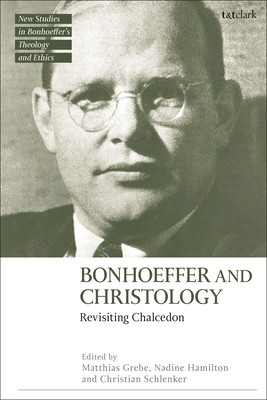
- We will send in 10–14 business days.
- Publisher: T&T Clark
- ISBN-10: 0567708411
- ISBN-13: 9780567708410
- Format: 15.6 x 23.4 x 1.8 cm, kieti viršeliai
- Language: English
- SAVE -10% with code: EXTRA
Bonhoeffer and Christology (e-book) (used book) | bookbook.eu
Reviews
Description
The key question this volume addresses is 'how does Bonhoeffer's thought help to re(dis)cover the doctrine of Christ's two natures and one person and understand and renew it in its significance for a modern post-metaphysical and secular world?'
The volume takes a fresh look at Dietrich Bonhoeffer's Christology and brings it into a fruitful dialogue with current Christological debates. In a multi-perspectival, pluralistic world, Bonhoeffer's thinking offers a productive basis for conceptually incorporating the openness required for this task into academic theology. Bonhoeffer's theology offers a starting point for the recovery of a productive Christology that reflects the plurality of the globalized world, as Bonhoeffer's Christology begins precisely with this integration into worldly reality, whereby the world is understood in its plurality and polyphony. In this way, he characterizes his enterprise as follows: "What keeps gnawing at me is the question, what is Christianity, or who is Christ actually for us today" (DBWE 8, 362). Accordingly, it opens itself up not only to inner-Christian discussion but also to non-Christian worldviews, from which a basic ethical demand follows.EXTRA 10 % discount with code: EXTRA
The promotion ends in 23d.12:54:05
The discount code is valid when purchasing from 10 €. Discounts do not stack.
- Publisher: T&T Clark
- ISBN-10: 0567708411
- ISBN-13: 9780567708410
- Format: 15.6 x 23.4 x 1.8 cm, kieti viršeliai
- Language: English English
The key question this volume addresses is 'how does Bonhoeffer's thought help to re(dis)cover the doctrine of Christ's two natures and one person and understand and renew it in its significance for a modern post-metaphysical and secular world?'
The volume takes a fresh look at Dietrich Bonhoeffer's Christology and brings it into a fruitful dialogue with current Christological debates. In a multi-perspectival, pluralistic world, Bonhoeffer's thinking offers a productive basis for conceptually incorporating the openness required for this task into academic theology. Bonhoeffer's theology offers a starting point for the recovery of a productive Christology that reflects the plurality of the globalized world, as Bonhoeffer's Christology begins precisely with this integration into worldly reality, whereby the world is understood in its plurality and polyphony. In this way, he characterizes his enterprise as follows: "What keeps gnawing at me is the question, what is Christianity, or who is Christ actually for us today" (DBWE 8, 362). Accordingly, it opens itself up not only to inner-Christian discussion but also to non-Christian worldviews, from which a basic ethical demand follows.

Reviews